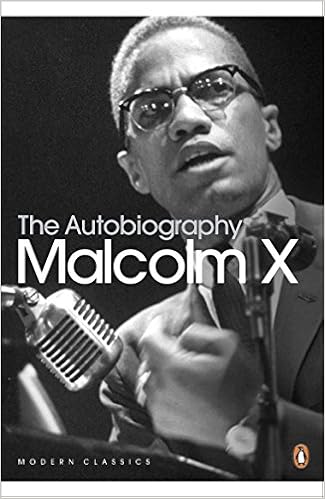
The Autobiography of Malcolm X was published in 1965, the result of a collaboration between human rights activist Malcolm X and journalist Alex Haley. Haley coauthored the autobiography based on a series of in-depth interviews he conducted between 1963 and Malcolm X's 1965 assassination. The Autobiography is a spiritual conversion narrative that outlines Malcolm X's philosophy of black pride, black nationalism, and pan-Africanism. After the leader was killed, Haley wrote the book's epilogue.a[›] He described their collaborative process and the events at the end of Malcolm X's life.
While Malcolm X and scholars contemporary to the book's publication regarded Haley as the book's ghostwriter, modern scholars tend to regard him as an essential collaborator. They say he intentionally muted his authorial voice to create the effect of Malcolm X speaking directly to readers. Haley influenced some of Malcolm X's literary choices. For example, Malcolm X left the Nation of Islam during the period when he was working on the book with Haley. Rather than rewriting earlier chapters as a polemic against the Nation which Malcolm X had rejected, Haley persuaded him to favor a style of "suspense and drama". According to Manning Marable, "Haley was particularly worried about what he viewed as Malcolm X's anti-Semitism" and he rewrote material to eliminate it.[1]
When the Autobiography was published, the New York Times reviewer described it as a "brilliant, painful, important book". In 1967, historian John William Ward wrote that it would become a classic American autobiography. In 1998, Time named The Autobiography of Malcolm X as one of ten "required reading" nonfiction books. James Baldwin and Arnold Perl adapted the book as a film; their screenplay provided the source material for Spike Lee's 1992 film Malcolm X.
Through a life of
passion and struggle, Malcolm X became one of the most influential
figures of the 20th Century. In this riveting account, he tells of his
journey from a prison cell to Mecca, describing his transition from
hoodlum to Muslim minister. Here, the man who called himself "the
angriest Black man in America" relates how his conversion to true Islam
helped him confront his rage and recognize the brotherhood of all
mankind.
An established classic of modern America, "The
Autobiography of Malcolm X" was hailed by the New York Times as
"Extraordinary. A brilliant, painful, important book." Still
extraordinary, still important, this electrifying story has transformed
Malcom X's life into his legacy. The strength of his words, the power of
his ideas continue to resonate more than a generation after they first
appeared.
'Books > nonfiction' 카테고리의 다른 글
| Working (0) | 2017.05.24 |
|---|---|
| Eminent Victorians (0) | 2017.05.24 |
| SAMUEL JOHNSON (0) | 2017.05.24 |
| The Affluent Society (0) | 2017.05.24 |
| A STUDY OF HISTORY (0) | 2017.05.24 |